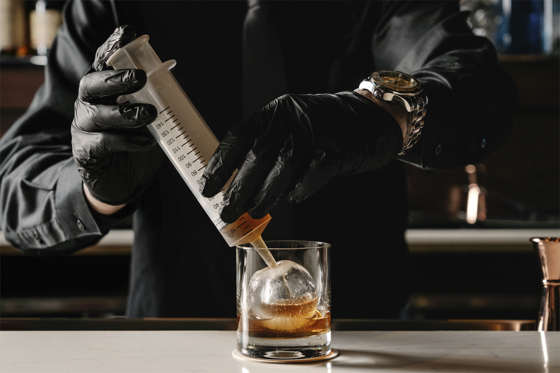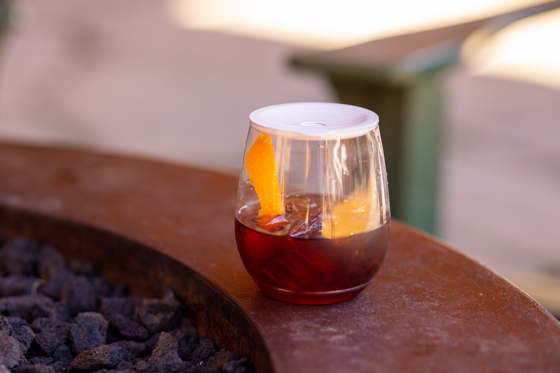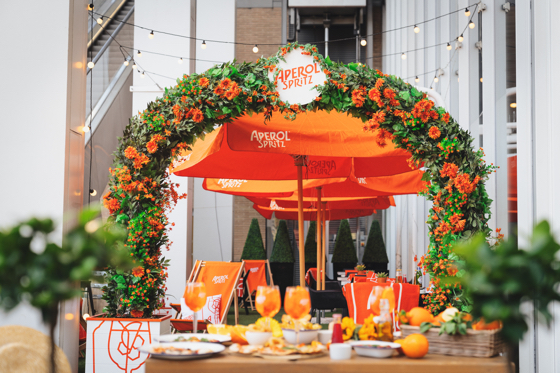Creativity and flexibility have continued to be the keys to drive bar revenue at hotels ever since the COVID-19 pandemic hit.
“Last year we definitely had to adjust our offerings for the reopening after the first lockdown,” said Kurt Macher, general manager of the Shangri-La Hotel, at the Shard, London. “Now, we are reopening for the third time.”
With lockdowns and ever-changing regulations, hoteliers have had to adjust on the spot. “We had a very successful year, despite all the challenges,” said Ian Pomerville, director of food and beverage at The Lodge at Spruce Peak in Vermont.
Contributed by Jeanette Hurt
Delivering cocktails and alcoholic beverages became a key component to drive revenue for The Lodge at Spruce Peak. While local regulations closed bars and restaurants down at 10 p.m., guests could still have their cocktails delivered to a patio or to their room, Pomerville said. “It not only met state mandates, but it also met guest expectations. Bars might have been shutting down earlier, but guests still wanted to hang out on the green so they’d call up and order a six-pack,” he said.
The first adjustment was to create to-go programs, and choosing the right glassware, especially for to-go cocktails and high-end wines and whiskies, and it was challenging, Pomerville said. “No one wants to drink a US$20 cocktail out of a plastic cup.”
To solve that program, Pomerville invested in disposable, recyclable glasses in a variety of sizes and styles. “Tossware makes a nice four-ounce taster with a little lid that looks like a whiskey glass, and we use those to deliver flights to the rooms and also for our outdoor pavilion,” Pomerville said. And at US$150 a flight, he said, the glass does matter.

For Anthony Langan, corporate director of food and beverage for Charlestowne Hotels, Charleston, South Carolina, bottled and to-go cocktail experiences were important to boost revenue. “Ready-to-drink, to-go cocktails grew about 90% over the year, and it will continue to grow in the future,” he said.
In London, there was also a 10 p.m. curfew, but since guests still wanted to enjoy themselves, mixologists from the Gong cocktail lounge at the Shangri-La would take a bar cart and make cocktails for guests right in their rooms. “This was very successful,” Macher said.
The hotel also turned some of elevators into moving bars, Macher said. “It was a surprise, little mini bar in the guest elevator, and the mixologists would give little tasters of our cocktail menu,” he said. “Every hour, they’d have different cocktails. It was a speakeasy in an elevator, and it was a big hit.”
At this writing, the United Kingdom was under more stringent social distancing laws, so when the Shangri-La reopened, it wasn’t clear as to whether they would be allowed to have the elevator speakeasies. “Once restrictions lift, we will bring it back because it was a big wow, a surprise moment,” Macher said. With the hotel’s latest reopening, the hotel’s head mixologist is bottling three different cocktails, and they’re calling it “Gong in a Bottle.”
“It’s a really customized cocktail from our mixologists so it’s not something you can get off the shelf,” Macher added. “When guests leave, you can send them off with (cocktails). There’s so many things you can do.”
Because people didn’t feel comfortable dining or drinking in large groups, the Shangri-La also took beds out of suites and put in round dining tables and chairs. “Our events team managed this, and if it was a special occasion, we decorated the rooms and did personalized messages on the windows,” Macher said. “One weekend, we did 35 proposals.”

At the Lodge at Spruce Peak, the resort rented out its speakeasy bar for private customers. “The space is so small, we couldn’t open to the public, but people were so missing the experience of it that they would rent it out just to have that cool bar experience,” Pomerville said. “They had a private speakeasy for the night, and that’s something we will continue to push. I did more business in selling it privately than I did when it was normally open. People are clamoring for these cool, private, elevated experiences.”
Pomerville said even after the world opens up, they’ll be looking for these intimate and interesting experiences. “I think we’ll continue to see demand for this, moving forward,” he said. “We’re already working on setting up a pop-up bar in our herb garden, and we’re going to do some cocktail classes out there, creating some of those cool, one-off experiences.”
Langan said that at his properties, outdoor dining and drinking experiences were popular. When hotels didn’t have enough outdoor spaces or the weather was prohibitive, he saw hotels turning meeting spaces into socially distant dining rooms. “Hotels already have these beautiful, well-appointed meeting spaces or ballrooms so it’s sort of a natural conversion to use them for a la carte dining, and it makes sense to use them to whatever degree you can,” he said.
With different markets reopening, the demand is “outperforming our reopening expectations,” Langan said. “It’s important to remember that a lot of people now coming into our hotels, this is their first real trip since the pandemic began,” he said. “We need to welcome them back and do so in such a way that makes them feel comfortable and safe. That is probably the most important thing for us this year.”

The Shangri-La Hotel in Toronto also did private dining and drinking experiences en-suite. “We did wine flights and wine tastings with our sommelier by Zoom, and we also did cocktail classes by Zoom,” said Nancy Munzar Kelly, general manager of the hotel. “The idea is to bring the bar experience to an en-suite environment.”
Kelly said they even did this for corporate clients by mailing out tasting kits and packages. “We did a corporate event with 40 people and our tea sommelier,” she said. “We mailed out a tasting package of tea and tea snacks, and at a certain time, all of their clients logged into this virtual event, and it was really well received.”
They also did this with coffee and with whiskies, too, Kelly said. “This is something that may last” post-pandemic, she said.
Locally sourced cocktails have become very important, said a spokesperson for the Six Senses Douro Valley, Portugal. “We have a very curated selection of cocktails with a story behind them,” he said.
The hotel’s bars also feature zero-waste cocktails. “Zero waste cocktails and homemade, fermented beverages are two of the current trends, but it is a way of life for us,” he said. “Shrubs, kefir, kombucha, fermented lemon, cured lemon…the list goes on and on.”
In London, people wanted to escape, but they couldn’t travel to the beach so the hotel brought the beach to them. “All the food would be what they might eat in Ibiza,” Macher said. “We used escapist inspiration.”
Another time they did “picnic in the clouds” afternoon tea in the lobby lounge, and this spring, they’re doing an afternoon tea in the park. “People can pick up their afternoon tea in a picnic basket, and they can take a bike and have afternoon tea in a London park,” Macher said. “We’ve been focusing on what our clients want and adjusting our offerings to the market.”
The afternoon tea in the park continues because people are craving to be outside, Macher said. The Shangri-La in London has also launched an outdoor, Aperol Terrazza, in partnership with Aperol. “It’s colorful, with Italian music and pizza, and we bring the Amalfi Coast to London,” Macher said.
In winter, the Shangri-La had a pop-up of a ski chalet, which also partnered with Beluga vodka. “If you partner with a sponsor, they also have a lot of reach for marketing, and that helps make it successful for them and for us,” Macher said.
“To whatever degree there’s a silver lining from this experience is that it has forced us to be creative and to think outside of the box and adopt new strategies and technologies faster than we would have otherwise,” Langan said. “I think we’ll be better off in the long run from doing that.”
